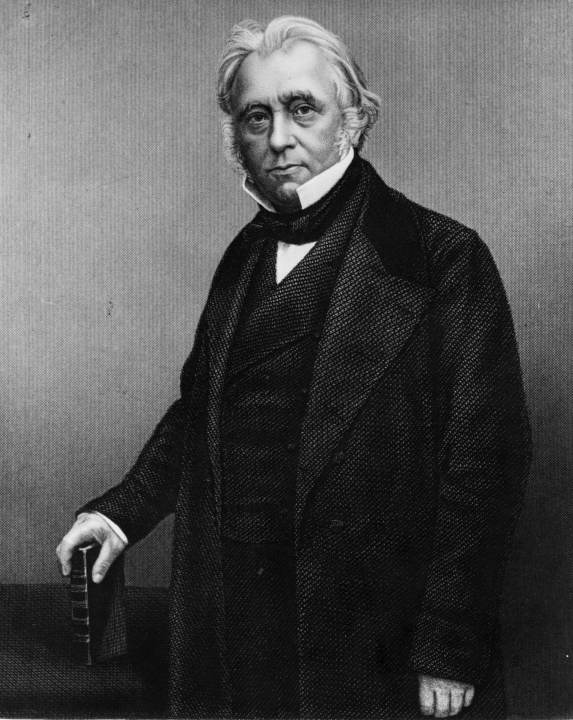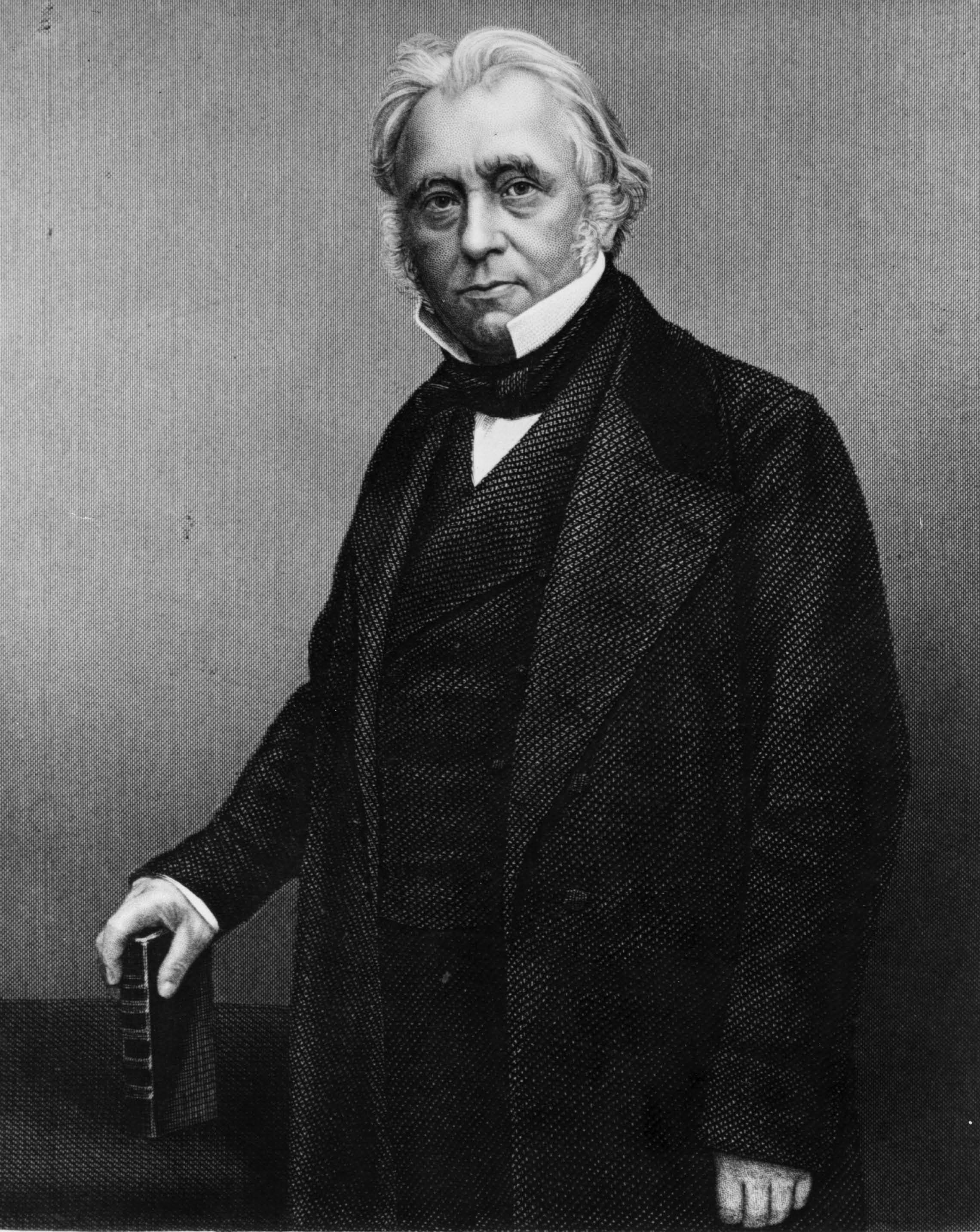Thomas Babington Macaulay’s early essays in the Edinburgh Review were an immediate success, and soon made him a respected figure in Whig society.
Thomas Babington Macaulay’s early essays in the Edinburgh Review were an immediate success, and soon made him a respected figure in Whig society. In 1830 Lord Lansdowne offered him a seat in parliament for the rotten borough of Calne. In 1848 he published the first volume of his History of England from the Accession of James II. It was an instant bestseller. He gave his readers a flattering image of themselves. The Whig Revolution of 1688 had made the English ‘the greatest and most highly civilised people that ever the world saw’. By 1857, when he was raised to the peerage, he had become a National Treasure.
Robert Sullivan, in his long and superbly researched book, chips away at this benign image. Macaulay’s letters to his sisters read like love letters, but to regard them as incestuous is absurd. He remained a bachelor not because he mourned the death of Margaret, or pined for Hannah — whom he hoped to keep as his housekeeper in India — but because he was a self-centred man. To his friends he was ‘Cocksure Tom’, an intellectual bully who delighted in defeating all opponents in debate. According to his critic, Carlyle, he was ‘short and rather pot-bellied’. He certainly was incapable of the small talk needed to seduce a woman.
For Sullivan, Macaulay’s relationship with his father was as convoluted as that with his sister, Hannah. Zachary, a leading and pious figure in the Clapham sect of evangelicals, was a heavy-handed father to the infant prodigy who could read at three and was writing poetry and history by the age of five. Thomas despised his father’s sentimental religiosity and became an atheist. ‘Morality should be based solely on regard to the well-being of mankind in the present life, to the exclusion of all considerations drawn from belief in God, or in a future state’.
Some of Sullivan’s best passages concern Macaulay’s passionate love for the classics, especially the Greeks. They provided him with a surrogate religion. Christian hymns were sorry stuff; pagan hymns full of beauty and truth. In other respects, however, he was a cultural philistine. Turner’s paintings were ‘daubs’, while the works of Kant were unintelligible, as if written in Sanskrit.
Zachary ended up a bankrupt. Thomas became a rich man, childishly priding himself on possessing a carriage and horses and a grand flat in Albany where he would hold breakfast parties for his friends. Like most rich men he regarded the state’s prime duty as being the protection of private property. There were three classes: the rich, ‘the middling rich’, and the vast mass of the poor, who might take it upon themselves to plunder the rich. They were a rabble, vermin, devoid of the intellect that qualified their superiors for the exercise of political power. The message of his great speech in support of the Reform Bill of 1832 was that the two intelligent classes should combine to resist the radicalism of an under class.
Macaulay was, in Sullivan’s view, a stern counter-revolutionary, in a society where revolution and anarchy were a distinct possibility. In these circum- stances democracy would bring disaster. The Chartists’ demand for universal manhood suffrage appalled him. ‘If you grant that, the country is lost’. Such an electorate was ‘incompatible with property, and consequently incompatible with civilisation’. He regarded Dickens’s sympathetic portrayal of the poor as sheer sentimentalism, and Napoleon III’s coup d’état as saving France from working-class socialists and anarchists.
Lack of faith in democracy is a venial sin. But Sullivan’s onslaught contains deadlier charges. Macaulay was an imperialist and a racist. He was sent out to India in 1835 to give the local inhabitants the benefits of English civilisation. Unlike Curzon, who respected Indian culture, Macaulay despised it. India, at some late date, might merit self-government. But for the present, given the rule of corrupt and sensual rajahs, ‘the next best thing’ was ‘a firm and impartial despotism’. Sullivan uses the following utterance to argue that Macaulay was little better than a Nazi:
It is in truth more merciful to extirpate a hundred thousand human beings at once and to fill the void with a well-governed population.
Here I part company with Sullivan. True, Macaulay argued in support of Clive’s and Warren Hastings’s conquests against Burke and the Orientalists, and thought the Sepoy mutineers of 1857 deserved condign punishment. But I do not think he would have approved of a British general ordering the massacre of unarmed Indians at Amritsar or white colonists shooting blacks in Kenya. Least of all would he have supported the extermination of millions of Jews in the gas chambers of Auschwitz and Treblinka.
Readers of this book should bear in mind the ideological divergence between the author and his subject. Sullivan is a committed Catholic, teaching history at the Catholic university of Notre Dame. Macaulay was a supporter of London University as a secular, godless institution, as distinct from Oxford and Cambridge with their college chapels.
Macaulay, Sullivan writes, had an ‘outsize capacity for self-deception’. The key, according to this impressive and subtle book, was Macaulay’s ‘doubleness’. ‘The history of England’, he wrote, ‘is the history of progress’. But, privately, he found ‘the world a tragi- comedy’. With a large readership in the United States, he praised to the skies the liberty conferred on its citizens by its democratic constitution. Yet he feared that it was unstable and might collapse into anarchy and civil war — which it did.
Sullivan concludes with a moving account of Macaulay’s last years as a victim of a series of heart attacks for which his doctor could prescribe no relief. With age he found it difficult, even boring, to sit down at his desk to write his daily stint. So do I.





Comments